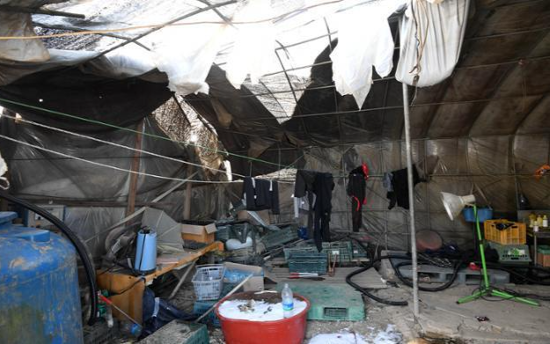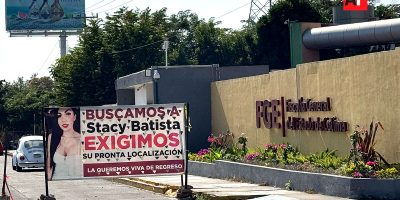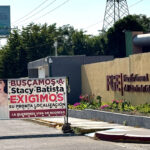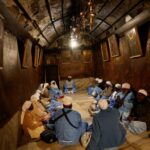
The roof of a makeshift structure inside a greenhouse in Geunchang-ri, Yongin, Gyeonggi Province, collapses due to record snowfall from Nov. 27 to Nov. 29, with water leaking inside. Two Cambodian migrant workers living there said their request for alternative housing was denied, and they were evicted on the morning of Nov. 29. Captured from Facebook
By KTimes
A Cambodian migrant worker who worked on a farm in Yongin, Gyeonggi Province, shared a harrowing account of her living conditions during last month’s record snowfall in a video shared via social media.
“Snow has crushed the roof, and water is leaking inside. It’s impossible to live here. It gets colder at night. The electricity is out, and I’m scared,” she said in the video. “I asked my boss for another place to stay, but I was kicked out of this house, which has no hot water. I begged for time to pack, but they gave me less than an hour. This is the life of a foreign worker. Is this really living?”
The video showed the roof — a makeshift sandwich-panel structure — collapsing with water pooling inside, creating the risk of possible electrocution. It quickly went viral, amassing over 610,000 views. Despite the attention, the worker’s current whereabouts remain unknown.
Amid ongoing criticism of the poor housing conditions faced by migrant workers, the Ministry of Employment and Labor has yet to release the findings from its promised full inspection of foreign workers’ accommodations earlier this year.
Meanwhile, requests from local governments for worker information so as to conduct housing inspections have been denied by the ministry on grounds of “personal data protection.”

A cramped and dirty accommodation for migrant workers in the fishing industry along the western coast of North Jeolla Province on Jan. 26, 2021. Overcrowding has left the space cluttered with various items. Korea Times file
Labor ministry denies local governments’ request for data
According to the ministry, in October, Gyeonggi Province requested that the ministry share information about farms and fisheries employing migrant workers in the region.
The request was aimed at trying to help the province inspect accommodations independently, as it is home to over 660,000 foreign residents — the largest number in Korea.
Gyeonggi even established a Migration and Social Affairs Bureau in July to enhance employment, housing and welfare support for migrants.
Despite aligning with the labor ministry’s stated goal of expanding local government roles regarding the improvement of migrant conditions, the request was rejected.
A labor ministry official said, “The business site list is classified as confidential under internal guidelines, and overlapping inspections are unnecessary since the ministry is conducting its own full-scale survey.”
However, the official added that the ministry is considering how to address the need for collaboration with local governments in the future.
The inspection, initially set to conclude by April, has yet to produce results, and it remains uncertain whether findings will be released before the year ends.

Former Vice Minister of Employment and Labor Lee Sung-hee discusses measures to strengthen central-local government collaboration on Korea’s foreign workforce support with directors from 17 provincial governments during the second Employment Permit System conference of 2023 on Oct. 17. Courtesy of the Ministry of Employment and Labor
Four years after Sokkheng’s death, issues persist
Dec. 20 marks the fourth anniversary of the death of Nuon Sokkheng, a 31-year-old Cambodian worker who froze to death in a plastic greenhouse shelter without heating amid a cold snap with temperatures dropping to minus 18 degrees Celsius.
Sokkheng’s death brought nationwide attention to the dire housing conditions faced by migrant workers, with the slogan “A plastic greenhouse is not a home” gaining prominence.
However, statistics show little improvement. According to Statistics Korea, one in five migrant workers under the Employment Permit System still lives in inadequate housing, including greenhouses, containers and shacks.
A 2020 government survey revealed that 69.6 percent of nonmanufacturing migrant workers lived in such substandard housing.
In response to Sokkheng’s death, the labor ministry implemented stricter housing standards in 2021, declaring that employment permits would not be granted if makeshift structures were provided as housing. Yet, activists argue that enforcement has been lax.
“After Sokkheng’s death, the labor ministry acted quickly to tighten housing standards, but enforcement has been weak, allowing employers to keep migrants in illegal structures,” said Kim Dal-seong, head of the Pocheon Migrant Workers Center.
“There’s also a new trend of employers bypassing regulations by omitting housing details on permit applications and later housing workers in unauthorized facilities,” Kim added.
Kim Yi-chan, head of the Global Station Center, criticized the ministry for enabling exploitation. “The labor ministry not only lacks oversight of housing conditions but has even formalized deductions for room and board from wages, making it more of an accomplice than a bystander.”

Pastor Kim Dal-seong, head of the Pocheon Migrant Workers Center, speaks during an interview with the Hankook Ilbo on Jan. 20, 2021. Korea Times file
This article from the Hankook Ilbo, the sister publication of The Korea Times, is translated by a generative AI system and edited by The Korea Times.

















